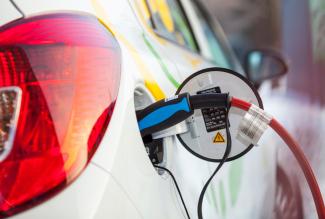Global warming
Technological revolution and prudent policymaking

The authors of the IPCC report point out that the Earth’s average surface temperature has risen by one degree Celsius since measurements began in 1850. They believe the 1.5 degree Celsius target is still possible from a scientific perspective, but it will require unprecedented changes in sectors like industry, transportation, energy and agriculture. Global emissions of greenhouse gases, especially carbon dioxide (CO2), will need to rapidly fall in the coming years. Depressingly, the trend is currently moving in the opposite direction. Since the early 1990s, CO2 emissions have skyrocketed and risen by 60 %.
I believe the 1.5 degree Celsius target is no longer attainable. Policymakers and industry are acting too slowly. But at least the two degree Celsius target could still be achieved. It would require industry to become carbon neutral by around 2050. Thereafter, negative emissions are required, which means net removal of CO2 from the atmosphere. That requires a technological revolution – and governments could make it happen if they created the right business environment. At the moment, however, that looks highly unlikely.
Germany ranks among the world’s ten largest CO2 emitters, with transport issues compounding problems in the energy sector. Transportation is the only sector with still increasing greenhouse gas emissions. The wrong incentives were set, encouraging the use of bigger cars. Too little was invested in public transport, including rail services. Norway, by comparison, introduced a congestion charge in Oslo many years ago and is now vigorously promoting e-mobility. Only electric cars are allowed into the city free of charge. The result is a win-win situation: air quality improves and greenhouse gas emissions are reduced.
Carbon pricing is another example of prudent policy. Over the past 12 months, the price in the European emissions trading system increased from seven to 20 euros per metric ton CO2, which is still too low. A price of around 50 euros would create incentives for strongly reducing CO2-emissions. Moreover, in the long run we have to remove CO2 from the atmosphere. If captured it could be used, for example, to produce renewable natural gas or synthetic fuels
Researchers are currently looking at a range of geo-engineering methods. These are technological options for slowing global warming. Injecting sulphur dioxide into the atmosphere is one example, using iron or phosphorus to fertilise the oceans is another. The risks of such methods are incalculable, however, and so are the financial requirements. Given that none of the technologies will be ready for deployment at a large scale anytime soon, reducing greenhouse gas emissions remains the top priority.
Unless decisive political action is taken, climate change will enhance inequality between countries. Poor countries cannot afford adaptation. For them, rising temperatures would have more adverse consequences than for the industrialised countries which have caused climate change in the first place.
Yes, China currently accounts for nearly 30 % of global CO2-emissions, but Europe and the USA have a historical responsibility. In terms of cumulative emissions – total historical emissions – they are responsible for half of the greenhouse gas build-up in the atmosphere. An important step forward would be if a number of industrialised countries set a good example by showing that healthy economic growth is possible without harming the environment.
Mojib Latif is a climate researcher at the Helmholtz Centre for Ocean Research Kiel and president of the Club of Rome Germany.
mlatif@geomar.de












